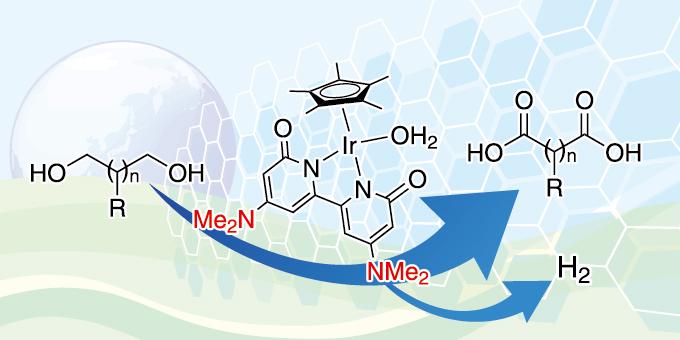Kyoto University simultaneously synthesizes dicarboxylic acids and hydrogen from diols

Credit: Kyoto University
Kyoto, Japan — Every year, the chemical industry makes trillions of dollars synthesizing the countless chemical compounds we use every day.
From pharmaceuticals for keeping you healthy to polyester woven into your shirt, industrial processes turn simple chemicals into complex, valuable compounds. Researchers in turn work constantly to develop new substances as well as safer and more efficient methods of production.
In a paper published in ChemSusChem, researchers from Kyoto University’s Graduate School of Human and Environmental Studies describe how they have significantly improved the process that leads to polymers and plasticizers. And as an added bonus, their method generates hydrogen as a byproduct.
“We use renewable chemical compounds collectively known as diols to dramatically change the synthesis of dicarboxylic acids,” explains corresponding author Ken-ichi Fujita, “These are needed to produce polymers, plasticizers, and lubricants.”
Existing production methods, based on the oxidation of hydrocarbons using toxic oxidants, generate harmful waste products. Knowledge of this motivated the team to work on a new method of synthesis, changing the initial compound along with the catalyst.
“We began by looking at liquid solutions of diols, which are more renewable than starting materials previously used,” continues Fujita.
“Then we needed to find a catalyst, and we settled on using iridium bound to a bipyridonate ligand.”
The team were pleased to find that combining the diols with the new catalyst generated dicarboxylic acids with greater efficiency and significantly more yield, as well as four equivalents of hydrogen for every unit of diols.
Developing more efficient and safer methods of compound production is vital for industrial organic chemistry, and for the global environment.
“It is a pleasant surprise to see how efficient our new process is,” concludes Fujita. “We hope to continue to improve safety and efficiency as we discover alternative chemical processes that are valuable to all humanity.”
###
The paper “Synthesis of Dicarboxylic Acids from Aqueous Solutions of Diols with Hydrogen Evolution Catalyzed by an Iridium Complex” appeared on 8 July 2020 in ChemSusChem, with doi: 10.1002/cssc.202001052
About Kyoto University
Kyoto University is one of Japan and Asia’s premier research institutions, founded in 1897 and responsible for producing numerous Nobel laureates and winners of other prestigious international prizes. A broad curriculum across the arts and sciences at both undergraduate and graduate levels is complemented by numerous research centers, as well as facilities and offices around Japan and the world. For more information please see: http://www.
Media Contact
Raymond Kunikane Terhune
[email protected]
Related Journal Article
http://dx.




